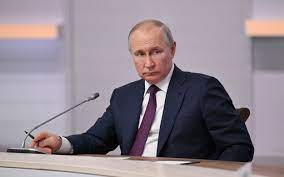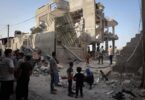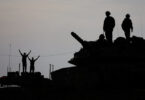Richard Kemp
War is – by definition – a bloody business. Yet if you had told me an army in the 21st century could lose eight generals in combat, and perhaps as many as 15, a mere 16 months into a campaign, I would have struggled to believe you. The death of Russian Major General Sergei Goryachev – reportedly killed this week in Ukraine by a British-supplied Storm Shadow missile – marks such a milestone. For context, no western army has faced such high fatality rates among its senior officers since 1945.
The death of Goryachev is a severe blow for Russian President Vladimir Putin’s defence against Ukraine’s counter-offensive. Goryachev was not just a general, but Chief of Staff of the 35th Combined Arms Army: a critical role responsible for planning, coordinating and controlling operations across a broad front. His death will mean the combat effectiveness of his forces will suffer major disruption. Not only that, but in his command post, Goryachev will have been surrounded by his most important staff officers. The loss of just one of these individuals can be keenly felt at the front. The closest parallel in my own experience was the death in 1994 of the Assistant Chief of Staff in Northern Ireland, along with 24 senior police and military intelligence officers. That was a helicopter crash not enemy action, but the impact on military operations, with the loss of their collective knowledge and experience, was long-lasting and profound.
In Ukraine, Russian generals have often been forced to the front through necessity. Last year we learned a combination of inferior secure communications and Ukrainian electronic warfare obliged some commanders to command from the front. But the problem runs deeper. The Russian way of warfare – still operating to a highly inflexible, top-down command doctrine – means that generals are often obliged to take personal command in a fashion alien to most western armies. Ukrainian commanders recently told me how Russians are still frequently paralysed until reports are transmitted upwards and new orders issued downwards: a laborious, time-consuming process. Sometimes forces are obliged to wait until a general arrives. Furthermore, just as their soldiers are sometimes pressed forward with a gun at their back, Russian generals are compelled to the front by the spectre of the menacing figure in the Kremlin.
By contrast, the Ukrainians have adopted a “mission command” style of operations used by the British, American and other Western forces. Here, subordinate commanders down to the lowest levels are given their mission and the freedom to carry it out without the need for detailed instructions from on high. They are trained to adapt to constantly shifting battlefield conditions, with the autonomy to change the plan on their own authority without the need for superiors to intervene. Russia’s weakness has been exploited by Ukraine, assisted by intelligence and surveillance that provides real-time satellite and aerial footage of Russian headquarters and the electronic signatures of senior officers, allowing their locations to be pin-pointed and struck. Last year, General Valery Gerasimov, the Russian Chief of Staff, escaped by the skin of his teeth as Ukraine launched a strike against a position in the east of the country that he had just left. Kyiv’s advantage has been multiplied by the recent supply of British Storm Shadow missiles, which allows Russian headquarters well to the rear of the fighting to be targeted at ranges previously unachievable. Command inflexibility will not bring about the defeat of the Russian army. Unlike many commentators, Ukrainian commanders do not underestimate their enemy. Several fresh from the front told me that they face a formidable opponent: tenacious, battle-hardened and willing to throw away huge numbers of soldiers’ lives to gain ground. These Ukrainian fighting men are also more aware than anyone of Moscow’s advantage in artillery, the greatest battle winner in this conflict.
But just as David’s precisely-aimed slingshot succeeded in felling the giant, continued Ukrainian precision strikes against logistics bases, supply lines and headquarters such as that of Goryachev’s army will, in time, undoubtedly help tip the scales.
The Telegraph







